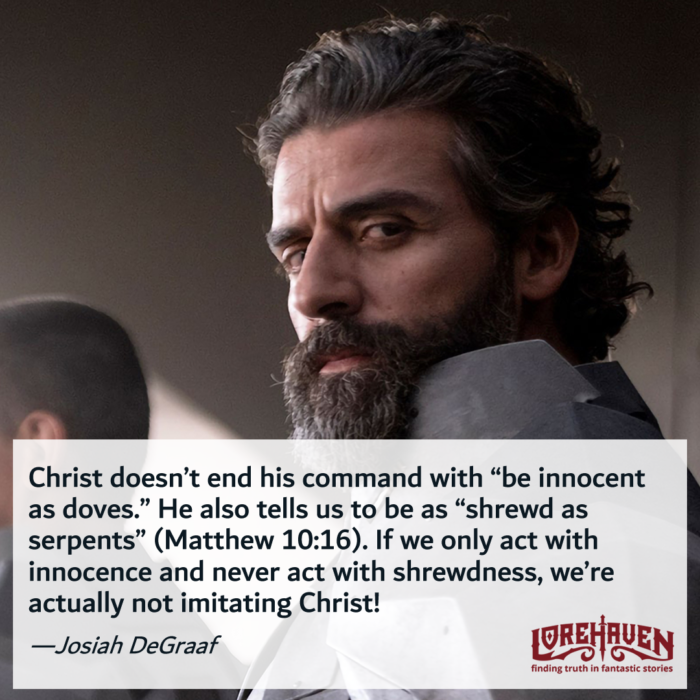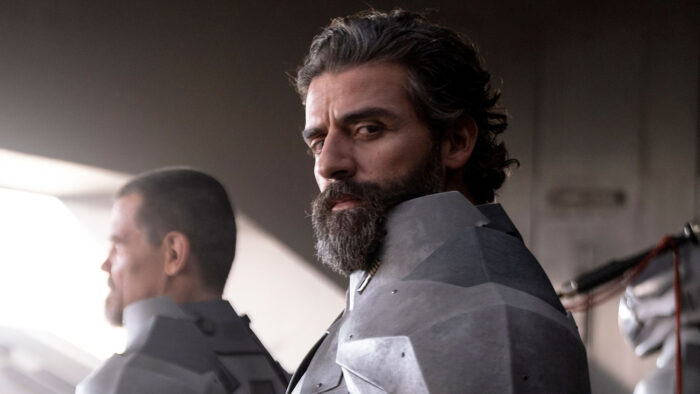Duke Leto Also Shows How Christians Can Practice Shrewd Wisdom in a Hostile World
One of the original Dune novel’s arguably best portions did not appear in the 2021 film. I’m speaking, of course, about the infamous dinner scene. Duke Leto Atreides and Lady Jessica invite a smuggler, a banker, and an ecologist for a royal banquet. This sets up a dinner theater performance featuring the secretive characters.
Many fans felt disappointed to see this scene cut from the film—even if the scene’s internal nature would make it hard to portray effectively onscreen. Dune author Frank Herbert uses this scene to establish many of the story’s hidden tensions, along with the sense of shrewdness that House Atreides possesses.
Today we will explore that virtue of shrewdness (or cunning), following after last week’s part 1 that examined how Duke Leto’s nobility shows how Christians can live in a hostile world. In that article, I unpacked what it means for Christians to live in negative spaces and how Leto constantly displayed nobility against pressing odds, and how Leto’s fictional portrayal can give Christians a model to emulate.
Leto, however, shows us more than his nobility. While director Denis Villeneuve’s film focuses on that particular character trait, the books’ Leto also shows much remarkable shrewdness. To live in negative spaces, Christians must be prepared to act with shrewdness along with nobility.
Dune: Part One also downplayed the Duke’s shrewdness
Herbert’s original novel shows many more events on the desert planet Arrakis. Leto knows a traitor lurks close to him (unlike the film’s slightly more-naïve depiction of Leto). House Arrakis’s duke intends to discover that person’s identity. He must not only search for the traitor himself, but also make his enemy of House Harkonnen think he’s falling into their trap. That’s why Leto must make people believe he does suspect his monogamous concubine, Lady Jessica, of betraying him. He puts on a face of naïveté to shroud his internal cunning.
Leto runs out of time before he discovers the traitor, yet not for lack of trying.
The film also avoids exploring Leto’s true motives on Arrakis. Dune: Part Two may emphasize Leto’s mission of winning the native Fremen and gaining their military prowess. In the book, the Empire’s Sardaukar soldiers are absolute killing machines, forming a force no one can resist—except for the Fremen. Because of their harsh living environment, the Arrakis natives have obtained strength that is superior even to the Sardaukar. Leto didn’t just move to Arrakis for the spice. He came to obtain a military force strong enough to hold his own against even the Emperor. Leto is not a naïve duke duped by the emperor, even though he often cultivates that image.
 Learning from Duke Leto’s example of shrewd wisdom
Learning from Duke Leto’s example of shrewd wisdom
We must also adopt the virtue of shrewdness when we enter negative spaces.
Sometimes in Christian circles, we can focus exclusively on making obvious moral choices. “Just be a good person, and trust God for the rest.” At first glance, this sounds like a biblical response. And there’s certainly a lot of truth in the notion!
But if that’s all we say, we hold an incomplete biblical response.
Christ doesn’t end his command with “be innocent as doves.” He also tells us to be as “shrewd as serpents” (Matthew 10:16). If we only act with innocence and never act with shrewdness, we’re actually not imitating Christ!
One may ethically question Leto’s decision to cast doubt on Jessica’s character, especially without telling Jessica this was all a feint. Still, this choice showcases Leto’s cunning. He was no naïve fool led to the slaughter. Rather, he coupled virtuous nobility with appropriate shrewdness to fight against a hostile world.
Again, words may not fully convey what we ought to learn from Leto’s example.
We can appreciate stories like Dune for their images, not specific moral theses.
But we can reflect on Leto’s example, finding our own spice-induced vision for dealing with hostile situations.
Duke Leto may have lost the battle, but he won the war
Dune fans may again raise a challenge: “But wait, didn’t the books’ original Duke Leto still fail in his mission?” His nobility and shrewdness didn’t appear sufficient to save him from the evil Harkonnens. How then could Leto serve as a model for us?
But this challenge assumes that Leto actually failed.
Leto may not have preserved his own life. Still, his nobility and shrewdness gave lessons his son could follow and an example to imitate. Before the novel closes, Paul breaks the might of the Harkonnens and even the Emperor.
Yes, Leto himself may have died. But his legacy prevailed.
When we enter negative spaces, we may not win every battle we confront. Scripture and history both show that we have no guarantee of such wins. Like Leto, we may fail to win individual battles or see the effects of our earthly choices. But when we, like Duke Leto, join biblical nobility with shrewdness, we may be surprised to see how much our choices can transform a planet—even one ravaged by hostile desert.





























They cut the dinner scene?? That’s tragic, though I see why they didn’t want to attempt it in film.
Leto is one of my favorite characters in the book, so I appreciate this two-part breakdown of his two primary sides.
So that’s where the dinner scene belongs. As someone who hasn’t read the book (I’m on a long waiting list at the library), one of the few things I knew was that there was a scene involving
ng a banquet and lots of intrigue and people talking in their heads. I was slightly confused by its absence.
Great points Josiah, anyway.